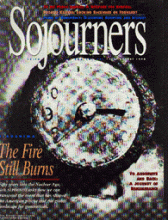In 1995, several faith communities in the southern Andean region of Peru sent a remarkable message to the United States. Largely "campesino" (peasant) in makeup, these parishes and congregations expressed their concern and sympathy for Americans in the aftermath of the Oklahoma City tragedy.
The history of the groups who made this gesture offers much food for thought to all of us who work at building community. During the '80s, inhabitants of the Peruvian highlands suffered horrendously at the hands of the Shining Path terrorists and the Peruvian military counterinsurgency forces. Peru had one of the world's worst human rights records, as guerrillas and soldiers outdid one another in atrocities against innocent civilians caught in the middle.
Given this history, one could understand that communities in the Peruvian highlands would readily empathize with the victims of a bombing and a country in mourning. Indeed, it is quite possible that their personal and collective suffering gives them the sensitivity to understand and respond to others' tragedies.
Still, the empathy, outreach, and brotherly and sisterly concern that those good people in Peru showed us, complete strangers and citizens of a far-off country, gives me pause. Those peasant communities, themselves victims of enormous violations, exhibited a remarkable capacity to embrace a hurting worldoursand to reach out to a numbed populaceus.
Probing deeper, in their outreach to us we see Christians capable of forgiving our affluence and domination, capable of overlooking the fact that historically the United States could well be called their oppressor. We have lived off the poverty of countries like Peru for generations.
Read the Full Article
